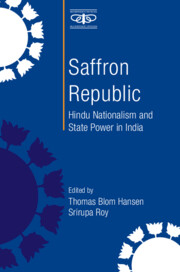10 - When Hindutva Performs Muslimness: Ethnographic Encounters with the Muslim Rashtriya Manch
Published online by Cambridge University Press: 31 May 2022
Summary
If we (Hindus) worship in the temple, he (the Muslim) would desecrate it. If we carry on bhajans and car festivals (rath yatras), that would irritate him. If we worship cow, he would like to eat it. If we glorify woman as a symbol of sacred motherhood, he would like to molest her. He was tooth and nail opposed to our way of life in all aspects – religious, cultural, social, etc. He had imbibed that hostility to the very core. (M. S. Golwalkar, second Supreme Commander of the RSS; 1966: 122)
Islam means security and peace, but today Islam is associated with violence, terror and fundamentalism. Is it not the responsibility of all of us to project the right face of Islam by tearing away this ‘naqab’ (mask) of terror, violence and fundamentalism? (K.S. Sudarshan, fifth Supreme Commander of the RSS; 24 December 2002 – Foundation Day of the Muslim Rashtriya Manch)
In 2002, India's premier Hindu nationalist organization, the Rashtriya Swayamsevak Sangh (RSS), formed a new affiliate, the Muslim Rashtriya Manch (MRM, or Muslim National Forum), dedicated to the cause of Muslim outreach. Why would the RSS feel the need to form and control an affiliated organization of Indian Muslims? Who is the ideal Muslim citizen as imagined and configured by the RSS? And why would Indian Muslims want to be associated with the RSS?
This essay focuses on the seemingly paradoxical phenomenon of Muslim outreach by the RSS. It draws upon my recent research/film documentation of the MRM, described ‘as an independent Muslim organization that receives guidance from the RSS’, and which was set up in 2002 by the RSS sarsanghchalak (supreme commander) K. S. Sudarshan.
I show that the establishment of the MRM has been influenced by goals of political agenda-setting, reframing, and legitimation where the RSS–BJP foregrounds the MRM to present versions of various anti-Muslim Hindu-majoritarian projects such as the Triple Talaq Bill – Muslim Women (Protection of Rights on Marriage) Bill – the revocation of Article 370 in Kashmir, and the building of the Ram Temple in Ayodhya. In recent months, the MRM has also been used to legitimize the anti-constitutional and discriminatory Citizenship Amendment Act (CAA) and justify the arrests of young Muslim anti-CAA student activists over flimsy charges in the aftermath of the February 2020 Delhi riots.
- Type
- Chapter
- Information
- Saffron RepublicHindu Nationalism and State Power in India, pp. 219 - 250Publisher: Cambridge University PressPrint publication year: 2022
- 2
- Cited by

